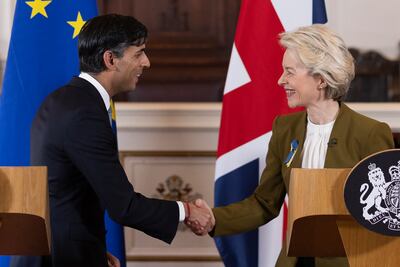VAT rules, customs declarations and bans on chilled sausages are hardly the stuff of high-level political drama. Nevertheless, squaring the circle of trade to and from Northern Ireland after Brexit has sapped the will of UK prime ministers, EU leaders and an army of officials over the past seven years.
Monday’s announcement that the UK and EU had reached a tentative deal on reforming Northern Ireland’s post-Brexit trade arrangements would, in most other circumstances, not be international news. Many would be forgiven for not getting fired up over the technicalities of a deal that would sort goods going from Great Britain to Northern Ireland into green and red lanes requiring different levels of checks and paperwork.
But for Europe, Northern Ireland is a place apart, and that is why this announcement is important. Formed by the 1921 partition of Ireland, home to a community divided by different religious and national identities, and scarred by a bloody armed conflict that dragged on for decades, this UK region of 1.9 million people was always going to be a very big thorn in the side of those who saw no downsides to the 2016 decision to leave the EU.
Before Brexit, Northern Ireland, the Republic of Ireland (a committed EU member) and Great Britain enjoyed seamless trade and travel thanks to their shared membership of the EU’s single market and customs union as well as the bilateral UK-Ireland Common Travel Area. Removing Northern Ireland from the EU against its will – a majority there had voted to remain – meant this fluid economy would change because the UK was no longer party to EU trade rules.

In January 2021, the UK government, then led by Boris Johnson, signed the Northern Ireland Protocol. This was to protect the single market and avoid a so-called hard border on the island of Ireland. However, the protocol introduced new checks on goods coming and going from the region. To avoid stopping and inspecting items along the snaking 500km demilitarised frontier with the Republic, it was decided to check goods arriving from Britain at Northern Ireland’s ports.
This “sea border” stoked resentment among the leaders of Northern Ireland’s unionist community, who value their British identity and felt a line down the Irish Sea was a threat to their place in the UK. Nationalists, who seek Northern Ireland’s unification with the Republic, wanted to see the protocol fully implemented. Thus an impasse over trade rules spilled over into the political arena, eventually paralysing Northern Ireland’s government, which is operated by unionists and nationalists in a complex and fragile power-sharing arrangement.
Monday’s deal struck by UK Prime Minister Rishi Sunak and European Commission President Ursula von der Leyen after delicate negotiations – now dubbed the Windsor Framework – would remove many of these trade checks and offer Northern Ireland’s elected politicians a potential veto over some aspects of new EU goods laws.
This is a fraught moment, and there are no guarantees of success. Northern Ireland’s politicians are now studying the text of the agreement and the Democratic Unionist Party – the biggest pro-British party in the Belfast government – may still require some persuasion. In Westminster, too, there may be trouble as some rebels in Mr Sunak’s Conservative Party could try and stall the legislation’s progress through Parliament.
On a wider level though, there is reason for optimism. The sight this week of a UK prime minister and senior EU leader standing side by side and extolling the virtues of a shared deal is a major step forward from the diplomatic rancour that has characterised Britain’s relationship with Europe since 2016.
Since that referendum decision, questions about Britain’s political standing remain unanswered. Angry scenes in Parliament, talks about talks and frosty meetings with erstwhile European colleagues have conspired to paint a picture of a country obsessed with one political decision.
For Northern Ireland, the stakes from Brexit’s tortuous outworkings were always much higher. It enjoys a precarious peace, and the attempted murder of a senior detective last week by a dissident IRA faction shows that the threat of violence and division remains.
Perhaps the 1998 Good Friday Agreement is the best place to seek guidance. It, too, was years in the making and managed to reconcile seemingly impossible and competing claims with the skilled application of some constitutional ambiguity. It also showed what was possible when people sat down together to find a way out of a debilitating political mess. If that determined spirit is still present, Northern Ireland, finally, might be left to the important work of peace, reconciliation and development.


